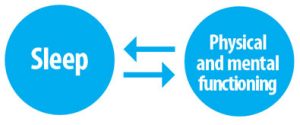TODAY I would like to talk about the importance of sleep – which has more benefits than I believe we all know. Unfortunately, many of us lose sleep over the holidays so I would like to remind everyone just how important it is to get those eight hours. While the eight is recommended for everyone, most people get an average of six hours of sleep per night.
Throughout the day, our brain is basically bombarded with information. Sleeping gives it the breather to process and store the information we need (and even things we don’t need- like the lyrics to very annoying songs). This means it improves and builds our ability to learn, memory and concentration while it completely energises us.
“Sleep on it” is a common saying as it brings peace, strength and clarity. It is basically a natural form of resilience.
Additionally, when we sleep, our body goes through physical changes such as decreased body temperature, slowed breathing and heart rate, relaxed muscles – all of which help to improve immune system functioning.
Traditionally, researchers and clinicians believed that issues with sleeping were simply a symptom of other psychiatric disorders. However, after many years of research, not only has it been identified as a cause of many illnesses but over 70 different types of sleep disorders in itself have been identified.
The most common is insomnia which is difficulty falling or staying asleep and sleep apnea which occurs when the individual has obstructed breathing that causes multiple awakenings throughout the night.
One who has a sleeping disorder is more likely to develop other psychiatric illnesses than the general population – some studies show up to four times more. These may include depression, anxiety, post-traumatic stress disorder (PTSD), phobias, substance abuse and even suicidal thoughts and behaviours. PTSD and phobias especially prevent sleep as nightmares are common symptoms of these disorders. Substance abuse will disrupt sleep, especially if the drug of choice is a stimulant.
Lack of sleep can pose a wide variety of both physical and mental problems. One is more at risk for various forms of cancer, heart disease and overall reduced immune functioning with sleep. Additionally, inattentiveness, emotional instability, issues with memory, changes in mood and negative thinking are common symptoms of sleep deprivation.
There are multiple lifestyle changes that can be made to increase our amount and quality of sleep. 
Eat and exercise well. These are the basics that promote sleep simply by keeping us energised throughout the day, allowing more of a deep and uninterrupted sleep at night.
Maintain a regular sleep cycle. Your body is a creature of habit and can definitely be trained into a routine. If you make an effort to go to bed and wake up at the same time every day, your body will eventually adapt to that schedule.
Try to make your bed a sanctuary for only sleeping. Many people watch TV, play games or eat in bed which encourages your body to be potentially prepared for other things when it is time to rest.
Try your best to keep all electronics out of the room.
Try relaxation or deep breathing techniques if you still feel energised even after tucking in. Take deep breaths and only pay attention to your breathing. This will allow both mind and body to relax.
If you drink caffeine (coffee, energy drinks etc.), ensure that you take none after 17:00hrs. Most know that caffeine will energise the body but many do not realise that alcohol and cigarettes/cigars do the same. While alcohol is a depressant drug and therefore it depresses the central nervous system which can help you to fall asleep, the jolt when the system ‘wakes up’ usually causes the individual to do the same- it affects the quality of your sleep. Cigarettes and cigars are stimulant drugs which means they excite the central nervous system, making it more difficult to sleep.
If you have tried the above modifications and still do not get sufficient sleep, please go to your nearest health centre and share your concerns. In some cases, medication may be prescribed to ensure better rest.
Remember to get your rest!
Thank you for reading and please send in any questions, comments or topics to caitlinvieira@gmail.com. Also please remember when you can come see me.
Georgetown Public Hospital: Monday- Friday – 08:00hrs- 12:00hrs
Woodlands Hospital: Outpatient Department
Drug and Alcohol group meetings – Mondays 16:00hrs
Good mental health group meetings- Wednesdays 16:00hrs
Suicide Prevention Helpline – 223-0001, 223-0009, 623-4444, 600-7896
Say Yes to Life and No to Drugs! Always!




.png)








